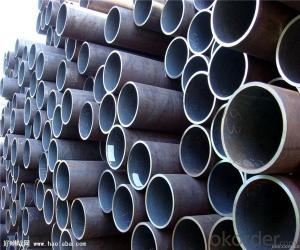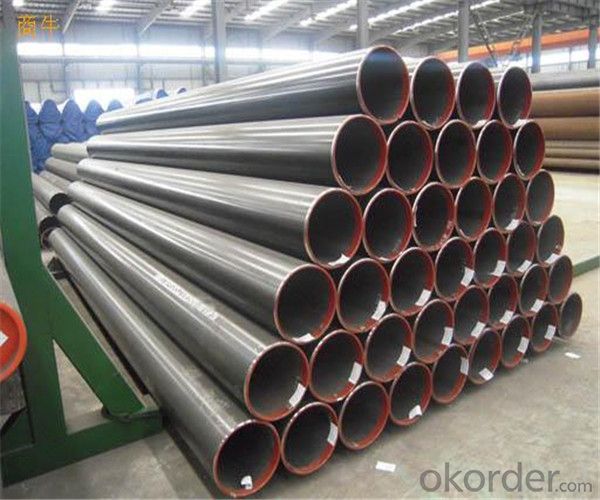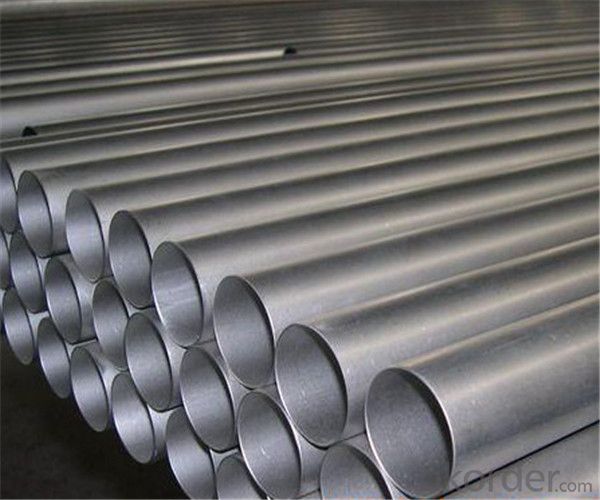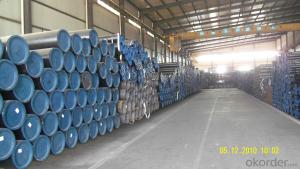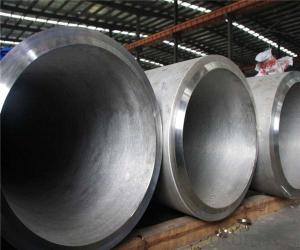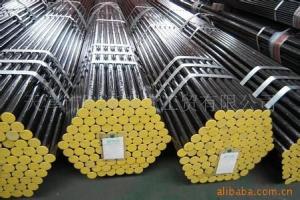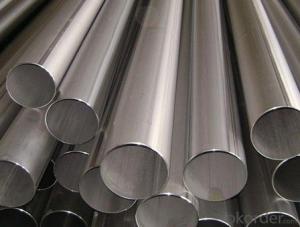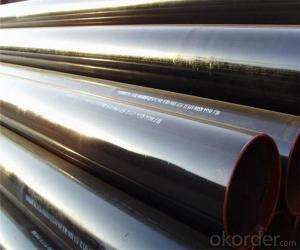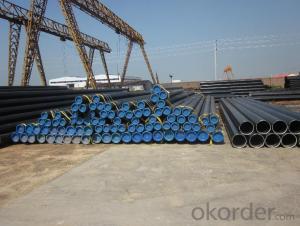2016 API Pipe seamless steel pipe with good quality from CNBM International Group
- Loading Port:
- Tianjin
- Payment Terms:
- TT or LC
- Min Order Qty:
- 100 m.t.
- Supply Capability:
- 3000000 m.t./month
OKorder Service Pledge
OKorder Financial Service
You Might Also Like
PRODUCT DETAILS
1.Structure of Seamless Steel Pipe Description:
A large amount of Seamless Steel Pipes is offered to the clients at cost effective rates. These pipes are extremely durable, resistant to corrosion and have high tensile strength. Our pipes are used in nuclear plants, power plants, refineries and construction industry across the country. Furthermore, we are capable of providing these seamless pipes to the clients in bulk quantity.
2.Main Features of the Steel Pipe:
• High manufacturing accuracy
• High strength
• Small inertia resistance
• Strong heat dissipation ability
• Good visual effect
•Reasonable price
3.Packaging & Delivery:
| Packaging Details: | Seaworthy packages, bundles wrapped with strong steel strip |
| Delivery Detail: | 15-30 days after received 30% TT |
4.Seamless Steel Pipe Specification:
| Standard: | GB, DIN, ASTM,ASME, ASTM A106-2006, ASTM A53-2007 |
| Grade: | 10#,20#, 45#, 16Mn |
Thickness: | 8 - 33 mm |
| Section Shape: | Round |
| Outer Diameter: | 133 - 219 mm |
| Place of Origin: | Shandong, China (Mainland) |
| Secondary Or Not: | Non-secondary |
| Application: | Hydraulic Pipe |
| Technique: | Cold Drawn |
| Certification: | API |
| Surface Treatment: | factory state or painted black |
| Special Pipe: | API Pipe |
| Alloy Or Not: | Non-alloy |
| Length: | 5-12M |
| Outer Diameter: | 21.3-610mm |
5.Product pictures
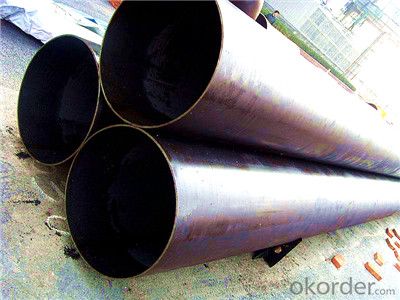
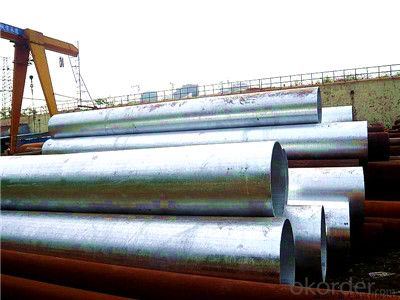
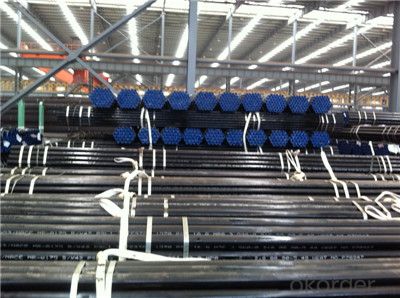
5.FAQ of Seamless steel pipe:
①How is the quality of your products?
Our products are manufactured strictly according to national and internaional standard, and we take a test
on every pipe before delivered out. If you want see our quality certifications and all kinds of testing report, please just ask us for it.
Guaranteed: If products’ quality don’t accord to discription as we give or the promise before you place order, we promise 100% refund.
②How about price?
Yes, we are factory and be able to give you lowest price below market one, and we have a policy that “ for saving time and absolutely honest business attitude, we quote as lowest as possible for any customer, and discount can be given according to quantity”,if you like bargain and factory price is not low enough as you think, just don’t waste your time.Please trust the quotation we would give you, it is professional one.
③Why should you chose us?
Chose happens because of quality, then price, We can give you both.Additionally, we can also offer professional products inquiry, products knowledge train(for agents), smooth goods delivery, exellent customer solution proposals.Our service formula: good quality+good price+good service=customer’s trust.
SGS test is available, customer inspection before shipping is welcome, third party inspection is no problem.
Any question, pls feel free to contact us !
- Q: What are the advantages of using steel pipes over other materials?
- Using steel pipes instead of other materials has several advantages: 1. Exceptional strength and durability: Steel pipes have the ability to withstand high pressure, heavy loads, and extreme weather conditions. This makes them suitable for various uses, such as transporting fluids and gases, providing structural support, and laying underground pipelines. 2. Enhanced resistance to corrosion: Steel pipes can be coated with different materials to increase their resistance to corrosion. This makes them ideal for transporting corrosive substances like water and chemicals without the risk of pipe degradation. Additionally, steel pipes are less prone to rust, which prolongs their lifespan. 3. Long-term cost-effectiveness: Although the initial cost of steel pipes may be higher than other materials, they offer long-term cost-effectiveness. Due to their durability and resistance to corrosion, steel pipes require less maintenance and replacement, resulting in reduced operational costs over time. 4. Versatility: Steel pipes come in various sizes, shapes, and thicknesses, making them versatile for different applications. They can be easily customized and fabricated to meet specific requirements, such as bending, welding, and threading. 5. Fire resistance: Steel pipes have a high melting point, making them resistant to fire and reducing the risk of structural damage in case of a fire incident. This characteristic is particularly important in industries where fire safety is crucial, such as oil and gas, chemical, and construction. 6. Environmentally friendly: Steel is a recyclable material, and steel pipes can be recycled and reused multiple times without compromising their quality. This not only reduces the demand for new materials but also contributes to environmental sustainability. 7. Excellent flow characteristics: Steel pipes have smooth internal surfaces, minimizing friction and allowing for efficient flow of fluids and gases. This advantage is particularly significant in industries where fluid dynamics and energy efficiency are essential, such as oil and gas, water supply, and HVAC systems. In conclusion, steel pipes offer numerous advantages over other materials, including strength, durability, corrosion resistance, cost-effectiveness, versatility, fire resistance, eco-friendliness, and excellent flow characteristics. These advantages make steel pipes the preferred choice for a wide range of applications in various industries.
- Q: What is the difference between hot dip galvanized steel pipe and galvanized steel pipe?
- 1, the process is different, one is chemical treatment, one is physical treatment; hot-dip galvanized coating is reliable, not easy to fall off2, hot-dip galvanized coating thickness, so strong corrosion resistance. And zinc plating (electroplating) coating evenly, surface quality is better, coating thickness is generally between a few microns to more than ten microns.3 hot galvanizing is a chemical process, which belongs to electrochemical reaction. Zinc plating is a physical treatment, just brush a layer of zinc on the surface, there is no galvanizing inside, so the zinc layer is easy to fall off. Hot-dip galvanizing is used in building construction.4 、 hot galvanized pipe is to make molten metal and iron matrix reaction and produce alloy layer, so that the substrate and coating two combination.
- Q: How are steel pipes used in the construction of geothermal power plants?
- Steel pipes are used in geothermal power plants for various purposes, including the transport of geothermal fluids from the underground reservoir to the surface, the distribution of these fluids within the plant, and the construction of the plant's infrastructure, such as the well casing and steam piping.
- Q: How does the price of steel pipes vary based on market demand?
- The price of steel pipes can vary based on market demand. When there is high demand for steel pipes, the price tends to increase as suppliers may have limited stock and are able to charge higher prices. Conversely, when the demand is low, the price of steel pipes can decrease as suppliers may offer discounts or reduce prices to encourage sales. Therefore, market demand plays a significant role in influencing the price fluctuations of steel pipes.
- Q: What is the size of seamless steel tube DN150?
- Seamless steel tube is generally used to indicate the outer diameter * wall thickness, DN150 seamless steel pipe GB wall thickness is 5mm. Wall thickness is a series of calculations based on your design, pressure, temperature, and pipe material.
- Q: How are steel pipes used in the manufacturing of sewage treatment plants?
- Steel pipes are used in the manufacturing of sewage treatment plants for various purposes, including the transportation of wastewater, the distribution of chemicals and additives, and the construction of various components such as tanks, pumps, and pipelines. Steel pipes are preferred due to their strength, durability, and resistance to corrosion, ensuring reliable and long-lasting infrastructure for the efficient operation of sewage treatment plants.
- Q: How are steel pipes connected or joined together?
- Steel pipes are typically connected or joined together using various methods such as welding, threading, flanges, or couplings.
- Q: How do steel pipes differ from other types of pipes?
- Steel pipes differ from other types of pipes in several ways. Firstly, steel pipes are incredibly durable and strong, making them suitable for carrying high-pressure fluids and gases. They have a high resistance to corrosion and can withstand extreme temperatures, making them ideal for various industrial applications. Additionally, steel pipes have a smooth interior surface, which reduces friction and allows for efficient flow of liquids or gases. They are also highly versatile, as they can be easily welded, threaded, or bent to fit specific project requirements. Overall, steel pipes are known for their strength, durability, and versatility, making them a preferred choice in many industries.
- Q: What is the difference between steel pipe and polyethylene pipe?
- Steel pipe and polyethylene pipe are utilized for plumbing and construction purposes, but they differ in terms of their materials and characteristics. Steel pipe derives its strength and durability from a combination of iron and carbon. It is commonly employed in industrial settings or for underground gas and oil pipelines where high pressure and heavy loads are expected. Steel pipe is renowned for its corrosion resistance and ability to withstand extreme temperatures. In contrast, polyethylene pipe is a plastic pipe crafted from either high-density polyethylene (HDPE) or low-density polyethylene (LDPE). It is lightweight, flexible, and easy to install, making it a popular choice for residential plumbing and irrigation systems. Polyethylene pipe can resist chemicals, UV rays, and abrasive materials, making it suitable for both above-ground and underground installations. Another notable distinction between steel pipe and polyethylene pipe is their respective costs. Steel pipe is generally more expensive due to the raw materials and manufacturing processes involved. Conversely, polyethylene pipe is relatively affordable and cost-effective, especially for smaller-scale projects. Regarding maintenance, steel pipe necessitates periodic inspections and maintenance to prevent corrosion and ensure durability. Conversely, polyethylene pipe is virtually maintenance-free due to its resistance to corrosion and chemical degradation. To summarize, the primary differences between steel pipe and polyethylene pipe lie in their composition, strength, durability, cost, and maintenance requirements. The choice between these pipes depends on the project's specific needs, considering factors such as pressure, load, budget, and environmental conditions.
- Q: What are the common grades of steel used in pipes?
- The common grades of steel used in pipes include ASTM A53, ASTM A106, and API 5L.
Send your message to us
2016 API Pipe seamless steel pipe with good quality from CNBM International Group
- Loading Port:
- Tianjin
- Payment Terms:
- TT or LC
- Min Order Qty:
- 100 m.t.
- Supply Capability:
- 3000000 m.t./month
OKorder Service Pledge
OKorder Financial Service
Similar products
Hot products
Hot Searches
Related keywords
